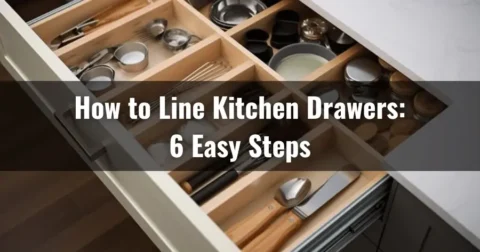Metal and wood are two commonly used materials in constructing kitchen drawers. Both options have pros and cons that will affect how your kitchen functions, lasts, and appears, but they differ significantly. Which material is best for your kitchen drawers?
When considering your kitchen drawers’ design and visual aesthetics, metal drawers are often sleek and modern, while wood drawers can add warmth and a rustic charm to your kitchen.
Regarding material options, metal provides a wide range of finishes, such as stainless steel or powder-coated colors, while wood offers various types, like oak or maple.
Discover the distinctive characteristics, advantages, expenses, and eco-friendliness of metal and wood kitchen drawers in this comprehensive comparison. By the end, you’ll clearly understand which drawer material choice aligns perfectly with your individual requirements and desires. Let’s unravel the mystery.
Jump to Section
Comparison Between Metal vs Wood Kitchen Drawers
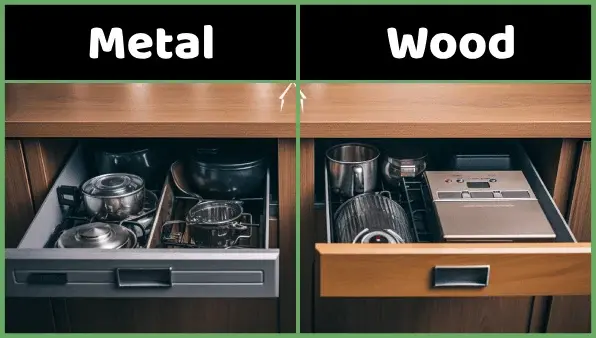
When considering kitchen drawers, two main materials often come into play: Metal and Wood. Both have their unique advantages, but they differ significantly from each other. According to our research, here are some key differences between these kitchen drawers:
- Material options
- Design and visual aesthetics
- Durability & longevity
- Customization
- Environmental impact
- Maintenance
- Cost Comparison
So let’s discuss them in detail:
Material Options
Your kitchen drawers can make a big difference in the look and feel of your space. Wooden kitchen drawers offer many options like beech, maple, or oak. They provide a warm and natural appearance that adds character to any kitchen.
Metal drawers, on the other hand, focus on ease of construction. They are predominantly metal-based, with stainless steel or aluminum being commonly used.
Visual Aesthetics
Wooden kitchen drawers offer an elegant and timeless visual appeal with solid wood boxes, dovetail or tongue-in-groove details, and reliable drawer slides.
Metal drawers are an excellent choice for a sleek and modern look in your kitchen. They provide a contemporary design aesthetic with durable tracks, double-wall technology, and reliable drawer slides.
Durability & Longevity
Wooden drawers offer both durability and longevity, making them an excellent choice for your kitchen. Their sustainable sourcing and longer lifespan add charm and durability to your space for decades. With their sturdy construction, these drawers can withstand years of use without losing their structural integrity.
Metal kitchen drawers are also durable that can last 15-20 years or more when used normally, but their longevity may differ from that of high-quality wooden drawers. Some metal drawers may rust over time. Their sustainability depends on the sourcing and recycling practices of the metal used.
Customization
In terms of customization, wooden kitchen drawers offer an array of options that allow for complete personalization.
With various bespoke priming and finishing choices, you have the freedom to create a look that perfectly matches your taste and complements the overall aesthetic of your kitchen. From selecting the type of wood to choosing the stain or paint color, every aspect can be customized according to your desires.
Conversely, metal kitchen drawers may have limited customization options compared to wood due to their inherent properties. Metal surfaces are often more challenging to modify due to their resistance against priming and finishing techniques.
While metal drawers can still be painted or powder-coated in different colors, they generally need a different variety and uniqueness offered by their wooden counterparts.
Environmental Impact
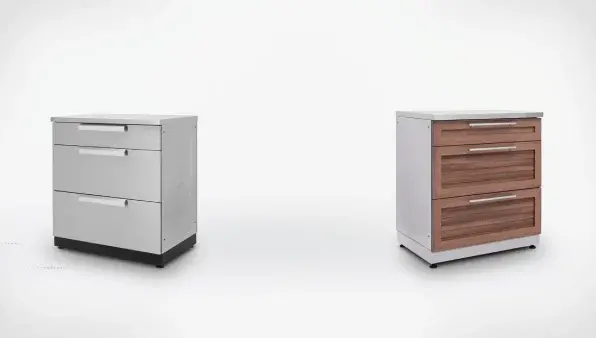
There are some advantages to using wooden drawers in terms of sustainability. They are biodegradable and have a lower carbon footprint compared to certain materials.
Also, wood is a renewable resource that can be replenished through responsible forestry practices. Some wooden drawers, such as low-VOC or water-based coatings, use environmentally friendly finishes.
In contrast, metal drawers can also be eco-friendly if made from recycled materials or have a high recyclability rate at the end of their lifecycle. However, note that producing metal drawers often requires significant energy input, which can contribute to a higher carbon footprint.
Maintenance
To maintain wooden kitchen drawers, you should regularly inspect them for signs of wear or damage. When cleaning wooden drawers, use only mild cleaners and avoid harsh chemicals that could harm the surface.
Any cracks or chips in the finish should be repaired promptly to prevent moisture from seeping into the wood. Applying a high-quality sealant or finish every few years will help protect against water damage and staining.
Alternatively, metal kitchen drawers require less maintenance due to their inherent resistance to moisture damage. Simply wiping them with a damp cloth regularly should keep them clean and free from stains. However, promptly addressing any scratches or chips in the protective coating is crucial to prevent rust and corrosion.
Cost Comparison
Regarding cost comparison, metal kitchen drawers generally have higher costs due to automation and standardized production. Using machinery in manufacturing increases efficiency and reduces labor costs, resulting in a higher price tag.
Then again, wooden kitchen drawers can benefit from efficiencies, especially with dovetail joint techniques. Yet, they may be lower in cost due to the availability of affordable raw materials and less reliance on advanced machinery.
Metal vs Wood Kitchen Drawers: Comparison Table
The following table highlights the key features of both materials, helping you make an informed decision for your kitchen.
| Features | Wood Kitchen Drawers | Metal Kitchen Drawers |
| Visual Aesthetics | Elegant and timeless appeal, dovetail or tongue-in-groove details | Sleek and modern look with durable tracks, double-wall technology |
| Material Options | Beech, maple, or oak wood | Stainless steel or aluminum materials |
| Durability & Longevity | Durable and long-lasting, can withstand for decades | Durable and can last 15-20 years |
| Customization | Wide array of options for personalization | Limited customization options |
| Environmental Impact | Biodegradable, lower carbon footprint, renewable resource. | high recyclability rate but higher carbon footprint |
| Maintenance | Regular inspection required | Requires less maintenance. |
| Cost Comparison | Lower cost due to availability | Higher costs due to automation and standardized production |
Maintenance Tips for Metal and Wood Kitchen Drawers
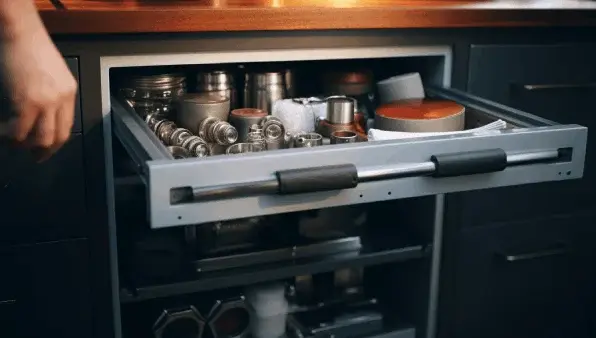
Keep these maintaining tips in mind when maintaining your wooden kitchen drawers:
Maintenance Tips for Wood Kitchen Drawers
- Inspect and tighten the hardware, such as screws and handles, to ensure stability.
- Clean the wooden drawers regularly using a soft, damp cloth to remove dust and debris. Avoid using abrasive cleaners that could damage the wood finish.
- Wipe off any spills immediately to prevent potential damage from excess moisture. We recommend using non-abrasive, mild cleaners designed specifically for wood surfaces and avoiding harsh chemicals that could strip or damage the wood’s protective finish.
- Depending on the type of wood and finish, consider applying a protective sealant or re-finishing the drawers periodically to maintain their appearance and protect against moisture.
- Use drawer liners or mats to protect the bottom of the drawers from scratches and moisture.
- Avoid overloading the drawers with heavy items, as excessive weight can strain the drawer slides and affect their smooth operation.
Maintenance Tips for Metal Kitchen Drawers
- Regularly inspect and tighten hardware like screws and handles for optimal maintenance to ensure stability and keep your metal drawers in top shape.
- Routine cleaning is essential for metal kitchen drawers. Remove dirt, grease, and fingerprints with a soft, damp cloth and mild soapy water. You shouldn’t use acidic or abrasive cleaners, which might degrade the finish or cause discoloration.
- Prevent rust by checking for any scratches or chips in the protective coating of the metal drawers. Apply touch-up paint or rust-resistant coating to exposed areas to prevent corrosion.
- To maintain smooth operation, periodically lubricate the drawer slides with a silicone-based or recommended lubricant.
- Consider placing soft pads or bumpers on the drawer interior to prevent items from scratching the metal surface.
FAQ’s
Are metal kitchen drawers better than wood?
Metal kitchen drawers have several advantages over wood ones. They are more durable and resistant to warping. This is due to their adjustable design and ability to withstand moisture and thermal fluctuations.
With metal drawers, you can maintain proper alignment easily, even during transport or changes in temperature and humidity. This makes them a reliable choice for your kitchen, as they won’t distort or become difficult to open and close over time.
Also, metal drawers are moisture-resistant, preventing potential damage caused by spills or high humidity in the kitchen environment. Their ability to withstand thermal fluctuations further adds to their durability, as they won’t expand or contract with changing temperatures.
What are the biggest disadvantages of metal kitchen drawers?
The biggest disadvantage of metal kitchen drawers is their potential for rust and noise. Rust can be a significant issue, as it not only diminishes the beauty of the cabinets but also requires extra care from the owner.
Spilling water or any other liquid can lead to rust formation, which can be difficult to remove and may even cause permanent damage. Also, metal drawers tend to be noisier compared to their wooden counterparts. Opening or closing these drawers often produces a metallic clanging sound that some find unpleasant.
What are the disadvantages of stainless steel kitchen drawers?
There are a few disadvantages to consider regarding stainless steel kitchen drawers:
- While they are easy to clean, stainless steel collects dust and stains, making your kitchen look dirty.
- The material is prone to heavy scratching, especially under mechanical stress, so you must be careful when handling heavy pots or utensils.
- Another drawback is the cost. Stainless steel drawers are generally more expensive (almost double) than wooden ones.
What should wood kitchen drawers be made of?
According to some experts, one popular choice for kitchen drawers is plywood. It provides a flat, strong, and stable option that retains shape better than most solid wood options. Plywood also has the advantage of expanding and contracting much less than solid wood, making it a reliable choice for kitchen drawers.
Regarding the thickness of plywood used for most drawers, 1/4 inch is commonly used, but we recommend using 1/2 inch thick plywood on larger drawers. This thickness ensures durability and strength when storing heavier items in the drawer.
What type of wood kitchen drawers last the longest?
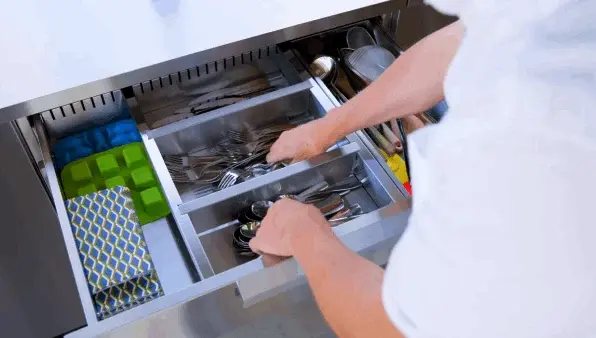
If you want long-lasting wood kitchen drawers, we recommend choosing solid woods like maple, oak, birch, walnut, or cherry for the longest-lasting kitchen drawers. They’ll endure for decades with proper care. These woods are known for their strength and durability, making them ideal for kitchen drawers.
- Maple is particularly popular due to its resistance to moisture and wear.
- Oak is also highly durable and can withstand heavy use without showing signs of damage.
- Birch offers a great balance between strength and cost-effectiveness.
- Walnut provides a beautiful dark finish while still maintaining its sturdiness.
- Cherry wood is long-lasting and adds a touch of elegance to any kitchen design.
Conclusion
Choosing between metal and wood kitchen drawers boils down to personal preference and needs, but there are significant differences to consider.
Metal drawers are designed to withstand the test of time. These sleek marvels fearlessly combat wear and tear, making them the perfect choice for bustling spaces. Yet, they have a weakness; the occasional scratch or dent may mar their impeccable charm as the years go by.
Conversely, wood drawers provide warmth and a classic aesthetic. They add a touch of natural beauty to any kitchen and can be customized to match the space’s overall style. In any case, they may require more maintenance, such as occasional refinishing or sealing, to keep them looking their best.
Ultimately, the choice between metal and wood drawers depends on personal preference and the overall style of your kitchen. Consider factors such as durability, aesthetics, and maintenance requirements when deciding.




